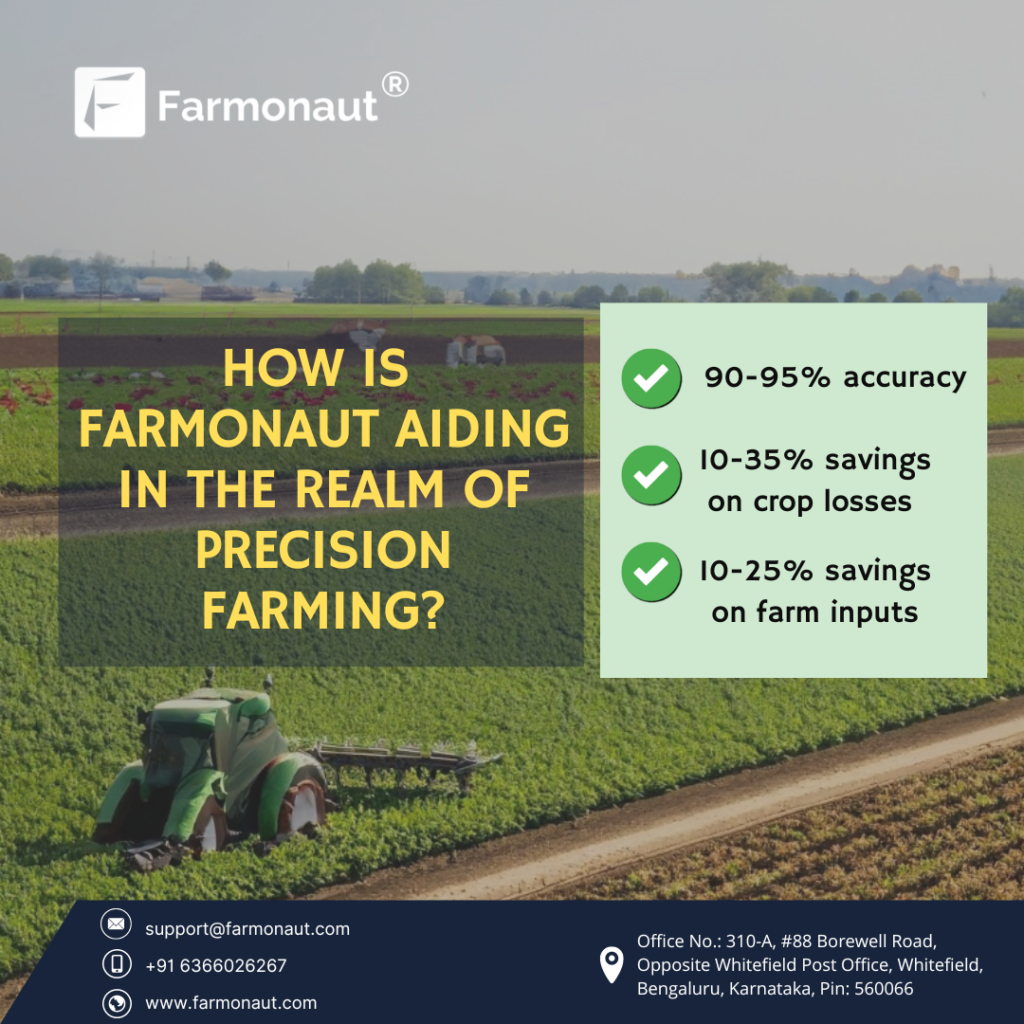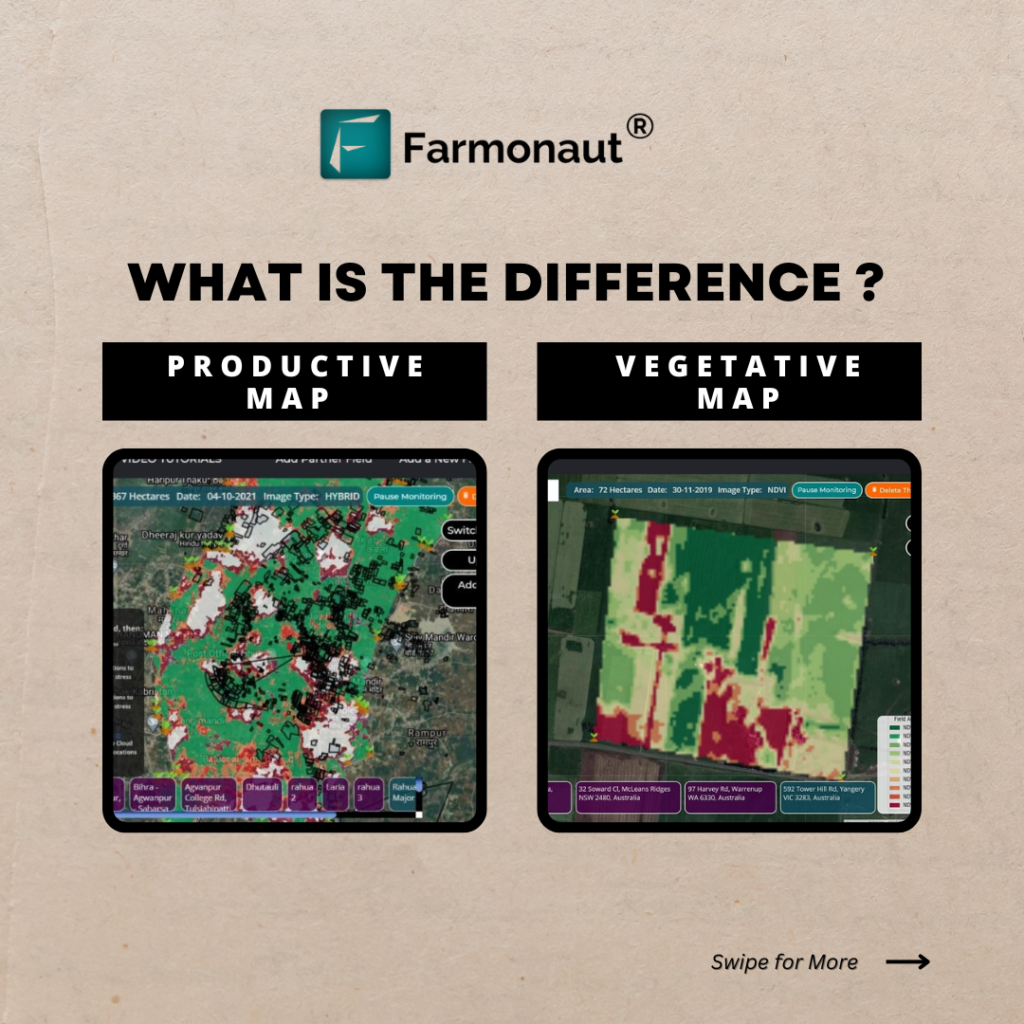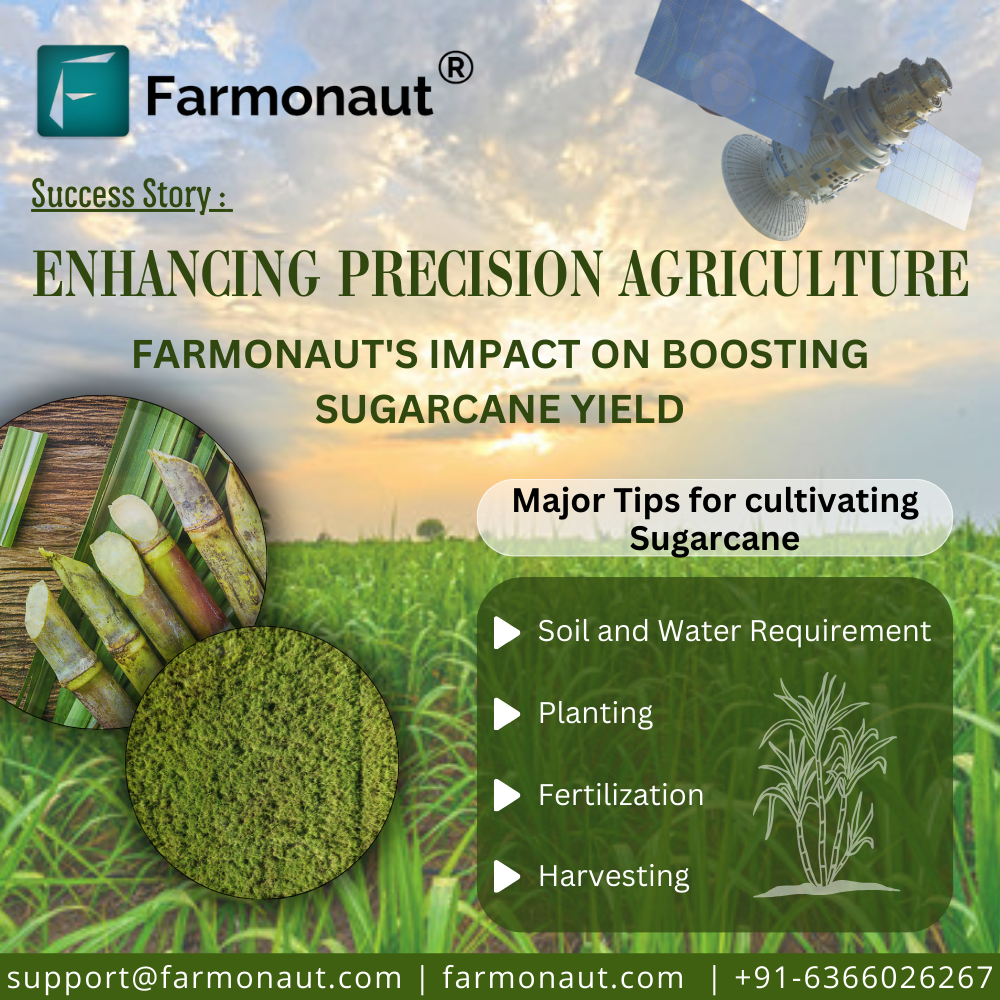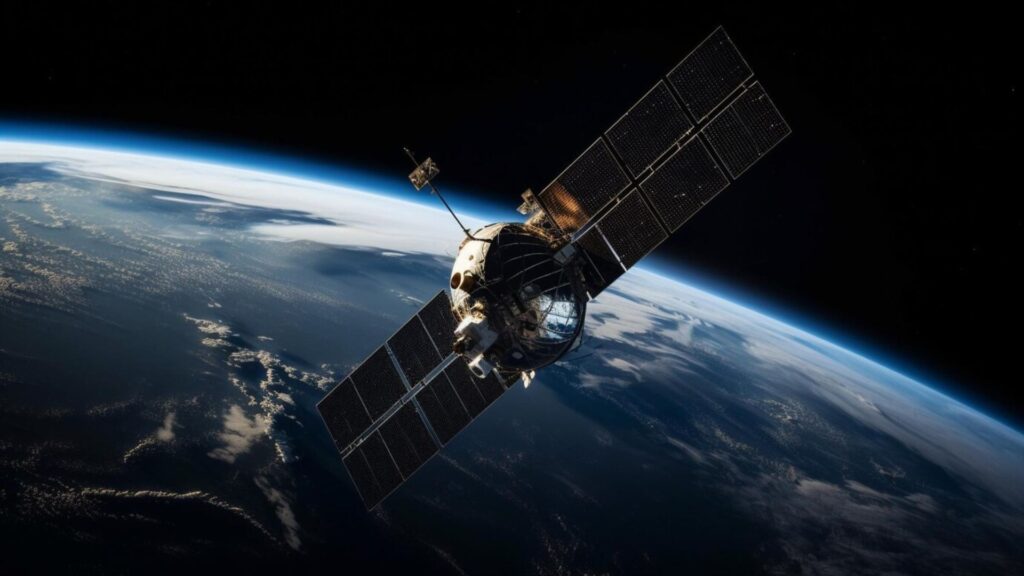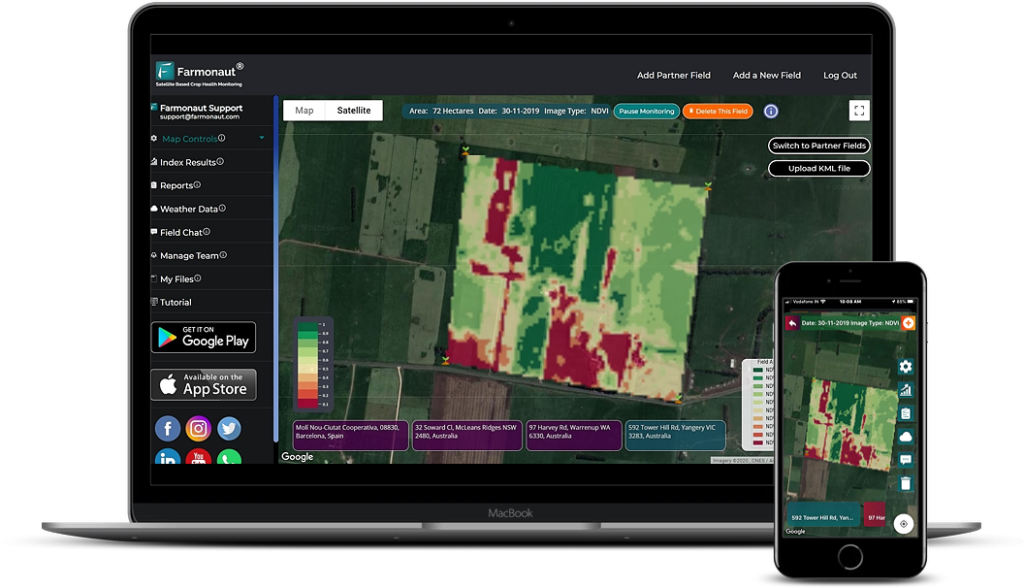AI-Powered Precision Agriculture: Revolutionizing Farming with Smart Technologies and Data-Driven Solutions
“AI-powered precision agriculture can increase crop yields by up to 30% while reducing water usage by 20-50%.”
In the ever-evolving landscape of agriculture, we at Farmonaut are witnessing a remarkable transformation driven by artificial intelligence (AI) and data-driven technologies. As pioneers in the field of precision agriculture, we’re excited to explore how these cutting-edge innovations are reshaping farming practices, enhancing productivity, and promoting sustainability.
The integration of AI in agriculture has ushered in a new era of smart farming solutions, revolutionizing the way we approach crop cultivation and resource management. From advanced crop monitoring systems to sophisticated agricultural data analytics, these technologies are empowering farmers with unprecedented insights and control over their operations.
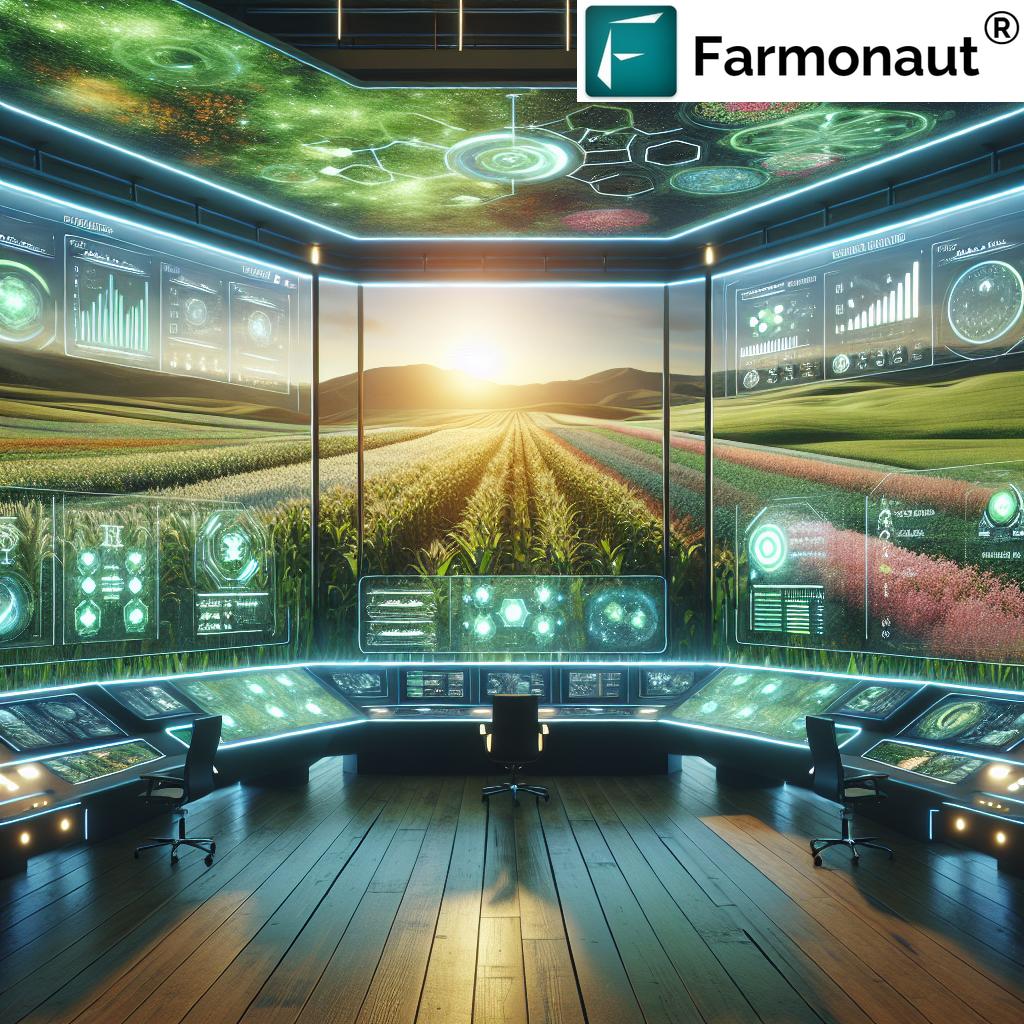
The Rise of AI in Agriculture
Artificial Intelligence has emerged as a game-changer in the agricultural sector, offering solutions to long-standing challenges and opening up new possibilities for efficient farming. Here’s how AI is making its mark:
- Precision Farming: AI algorithms analyze vast amounts of data from satellite imagery, soil sensors, and weather stations to provide precise recommendations for planting, irrigation, and harvesting.
- Crop Health Monitoring: Machine learning models can detect early signs of crop diseases or pest infestations, allowing for timely interventions.
- Yield Prediction: AI-powered systems can forecast crop yields with remarkable accuracy, helping farmers and agribusinesses make informed decisions.
- Resource Optimization: Smart algorithms optimize the use of water, fertilizers, and pesticides, reducing waste and environmental impact.
At Farmonaut, we’ve harnessed the power of AI to develop our cutting-edge farm management software, which integrates seamlessly with our satellite-based monitoring systems. Our platform offers real-time insights and actionable recommendations, empowering farmers to make data-driven decisions that boost productivity and sustainability.
Precision Agriculture Technologies: A Closer Look
Precision agriculture technologies are at the forefront of the agricultural revolution, offering a suite of tools that enable farmers to manage their fields with unprecedented accuracy. Let’s delve into some of the key technologies shaping the future of farming:
1. Satellite-Based Crop Monitoring Systems
Satellite imagery has become an invaluable tool in modern agriculture. By capturing multispectral images of farmlands, these systems provide critical information about crop health, soil moisture levels, and overall field conditions. At Farmonaut, we leverage advanced satellite technology to offer our users comprehensive crop monitoring capabilities.
- NDVI (Normalized Difference Vegetation Index): This index helps assess crop health and vigor by measuring the difference between near-infrared and red light reflectance.
- Soil Moisture Analysis: Satellite data can indicate soil moisture levels, helping farmers optimize irrigation schedules.
- Change Detection: By comparing images over time, farmers can track crop growth patterns and identify areas of concern.
2. IoT in Agriculture
The Internet of Things (IoT) has found a natural home in agriculture, with connected devices and sensors providing real-time data on various aspects of farm operations. These smart devices form the backbone of many precision agriculture systems:
- Soil Sensors: These devices measure soil moisture, temperature, and nutrient levels, enabling precise irrigation and fertilization.
- Weather Stations: On-site weather monitoring helps farmers make timely decisions based on local conditions.
- Smart Irrigation Systems: Automated irrigation systems use sensor data to apply water only when and where it’s needed, significantly reducing water waste.
Our farm management software at Farmonaut integrates seamlessly with various IoT devices, providing a centralized platform for data collection and analysis.
3. Data-Driven Farming and Agricultural Data Analytics
The abundance of data generated by precision agriculture technologies has given rise to sophisticated agricultural data analytics platforms. These systems process and analyze vast amounts of information to provide actionable insights:
- Predictive Analytics: By analyzing historical data and current conditions, these systems can predict crop yields, disease outbreaks, and optimal harvest times.
- Prescriptive Analytics: Advanced algorithms provide specific recommendations for crop management, such as optimal planting dates or fertilizer application rates.
- Machine Learning Models: These models continuously improve their predictions and recommendations as they process more data over time.
At Farmonaut, we’ve developed our own AI-powered advisory system, Jeevn AI, which delivers personalized recommendations based on a comprehensive analysis of satellite data, weather forecasts, and other relevant factors.
Explore Farmonaut’s API for advanced agricultural data analytics
Smart Farming Solutions: Integrating Technology for Better Results
Smart farming solutions represent the convergence of various precision agriculture technologies into cohesive systems that address multiple aspects of farm management. These integrated platforms offer a holistic approach to farming, combining data from various sources to provide comprehensive insights and automation capabilities.
“Farmonaut’s farm management software integrates over 10 AI-driven features to optimize farming processes and improve decision-making.”
Key Components of Smart Farming Solutions:
- Farm Management Software: Centralized platforms that integrate data from various sources and provide a user-friendly interface for farm management.
- Automated Machinery: Smart tractors and other farm equipment that can operate autonomously or with minimal human intervention.
- Drone Technology: Unmanned aerial vehicles (UAVs) used for crop scouting, spraying, and mapping.
- AI-Powered Decision Support Systems: Advanced algorithms that analyze data and provide actionable recommendations for farm operations.
Our farm management software at Farmonaut exemplifies this integrated approach, offering a comprehensive suite of tools for crop monitoring, resource management, and decision support. By combining satellite imagery, weather data, and AI-driven analytics, we provide farmers with a powerful platform to optimize their operations and increase productivity.
Check out our API Developer Docs for integration possibilities
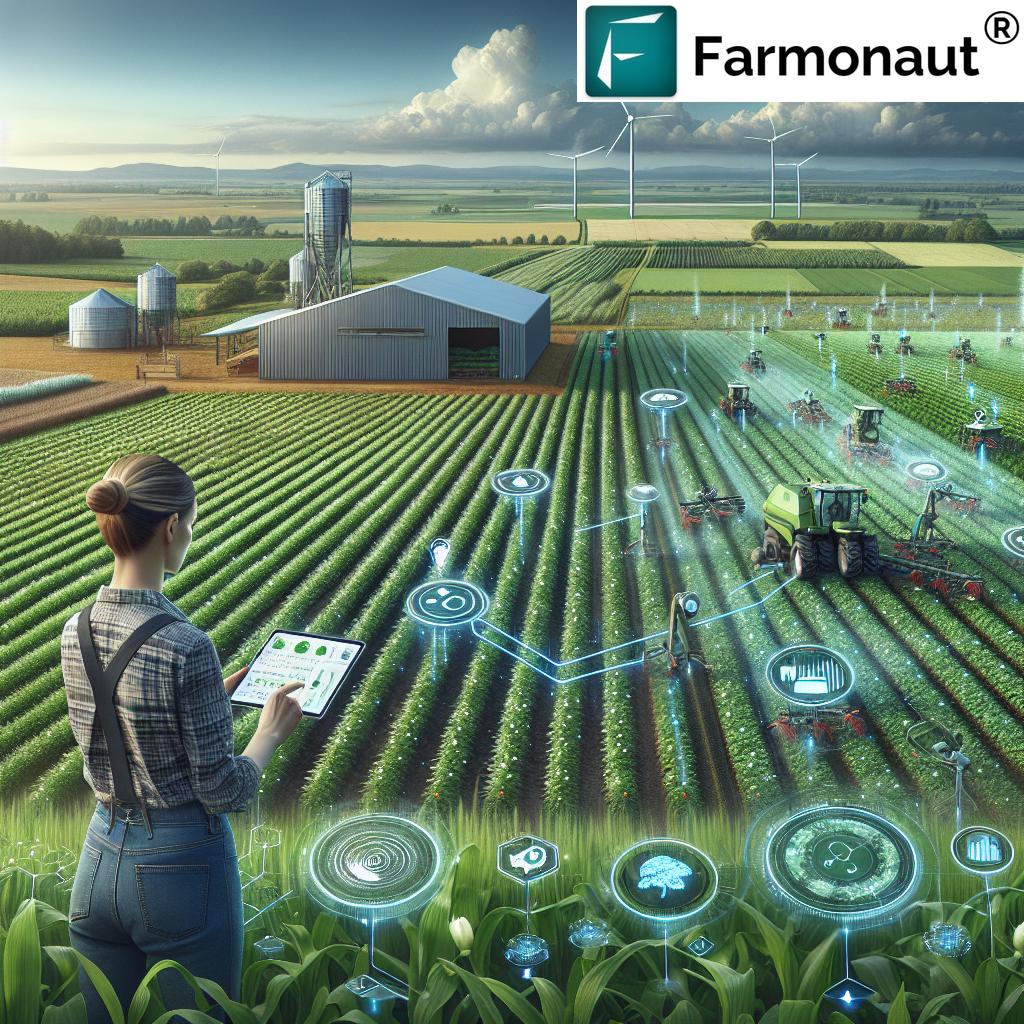
The Impact of Digital Agriculture Trends
As we continue to witness the rapid evolution of agricultural technology, several digital agriculture trends are shaping the future of farming:
- Blockchain in Agriculture: Enhancing traceability and transparency in supply chains.
- Vertical Farming: Utilizing AI and IoT to optimize indoor farming environments.
- Robotics and Automation: Developing autonomous systems for planting, harvesting, and crop management.
- Big Data Analytics: Leveraging vast datasets to uncover patterns and insights for improved decision-making.
- Precision Livestock Farming: Applying precision agriculture principles to animal husbandry.
At Farmonaut, we’re constantly innovating to stay ahead of these trends, incorporating cutting-edge technologies into our platform to provide farmers with the most advanced tools available.
Sustainable Agriculture Practices Through Technology
One of the most significant benefits of AI-powered precision agriculture is its potential to promote sustainable farming practices. By optimizing resource use and minimizing environmental impact, these technologies are helping to create a more sustainable agricultural sector:
- Water Conservation: Precision irrigation systems can reduce water usage by up to 50% while maintaining or improving crop yields.
- Reduced Chemical Use: Targeted application of fertilizers and pesticides minimizes chemical runoff and soil degradation.
- Carbon Footprint Reduction: Efficient farming practices and resource management lead to lower greenhouse gas emissions.
- Biodiversity Protection: Precision farming techniques can help preserve natural habitats by maximizing yield on existing farmland.
Our farm management software at Farmonaut includes features specifically designed to support sustainable agriculture, such as our carbon footprinting tool, which helps agribusinesses monitor and reduce their environmental impact.
Overcoming Challenges in AI-Powered Agriculture
While the benefits of AI-powered precision agriculture are substantial, there are several challenges that need to be addressed for widespread adoption:
- Digital Divide: Ensuring that small-scale farmers have access to these technologies.
- Data Privacy and Security: Protecting sensitive farm data from unauthorized access or misuse.
- Technical Expertise: Providing farmers with the necessary training to effectively use advanced technologies.
- Infrastructure Requirements: Developing the necessary connectivity and power infrastructure in rural areas.
- Initial Investment Costs: Making precision agriculture technologies more affordable for farmers of all scales.
At Farmonaut, we’re committed to addressing these challenges by offering affordable, user-friendly solutions and providing comprehensive support to our users. Our platform is designed to be accessible to farmers of all scales, helping to bridge the digital divide in agriculture.
The Future of AI in Agriculture
As we look to the future, the potential for AI in agriculture continues to expand. Some exciting developments on the horizon include:
- Advanced Computer Vision: Improving the accuracy of crop health assessment and pest detection.
- Natural Language Processing: Enabling more intuitive interfaces for farm management systems.
- Edge Computing: Bringing AI capabilities directly to the field for real-time decision-making.
- Predictive Maintenance: Using AI to anticipate and prevent equipment failures before they occur.
- Genetic Algorithms: Optimizing crop breeding programs for improved resilience and yield.
At Farmonaut, we’re constantly exploring these emerging technologies to enhance our platform and provide our users with the most advanced tools available for precision agriculture.
Comparative Analysis of AI-Powered Precision Agriculture Technologies
| Technology | Key Features | Primary Benefits | Estimated Yield Improvement |
|---|---|---|---|
| Crop Monitoring Systems | Satellite imagery analysis, NDVI mapping | Early detection of crop stress, optimized resource allocation | 10-15% |
| Agricultural Data Analytics Platforms | Predictive modeling, machine learning algorithms | Data-driven decision making, improved forecasting | 15-20% |
| IoT Sensors for Agriculture | Real-time soil and climate monitoring | Precision irrigation, targeted fertilizer application | 20-25% |
| Farmonaut’s Farm Management Software | Integrated satellite monitoring, AI advisory system, blockchain traceability | Comprehensive farm management, sustainable practices, supply chain transparency | 25-30% |
As demonstrated in the table above, Farmonaut’s farm management software offers a comprehensive solution that integrates multiple AI-powered technologies, potentially leading to higher yield improvements compared to standalone systems.
Conclusion: Embracing the AI-Powered Agricultural Revolution
As we’ve explored throughout this article, AI-powered precision agriculture is revolutionizing the farming industry, offering unprecedented opportunities for increased productivity, sustainability, and resource efficiency. From advanced crop monitoring systems to sophisticated data analytics platforms, these technologies are empowering farmers to make more informed decisions and optimize their operations like never before.
At Farmonaut, we’re proud to be at the forefront of this agricultural revolution, providing farmers with cutting-edge tools and insights to navigate the challenges of modern agriculture. Our integrated farm management software, powered by AI and satellite technology, represents the future of farming – a future where data-driven decisions lead to better yields, reduced environmental impact, and a more sustainable food system for all.
As we continue to innovate and develop new solutions, we remain committed to our mission of making precision agriculture accessible and affordable for farmers worldwide. By harnessing the power of AI and data-driven technologies, we believe we can help create a more resilient and productive agricultural sector, capable of meeting the growing global demand for food while preserving our planet’s precious resources.
The journey towards fully AI-powered agriculture is just beginning, and we invite you to join us in shaping the future of farming. Together, we can cultivate a smarter, more sustainable world – one field at a time.
Frequently Asked Questions (FAQ)
- What is AI-powered precision agriculture?
AI-powered precision agriculture refers to the use of artificial intelligence technologies in farming practices to optimize crop yields, reduce resource waste, and improve overall farm management through data-driven decision-making. - How does satellite-based crop monitoring work?
Satellite-based crop monitoring uses multispectral imagery from satellites to assess crop health, soil moisture levels, and other field conditions. This data is then analyzed using AI algorithms to provide insights and recommendations to farmers. - What are the main benefits of using Farmonaut’s farm management software?
Farmonaut’s software offers real-time crop health monitoring, AI-driven advisory services, resource optimization tools, and blockchain-based traceability solutions. These features help increase productivity, promote sustainability, and improve supply chain transparency. - How can AI help in sustainable agriculture?
AI can promote sustainable agriculture by optimizing resource use (water, fertilizers, pesticides), reducing waste, improving crop yields on existing farmland, and helping farmers adapt to changing climate conditions. - Is Farmonaut’s technology suitable for small-scale farmers?
Yes, Farmonaut’s solutions are designed to be accessible and affordable for farmers of all scales, including small-scale farmers. Our platform offers flexible pricing options and easy-to-use interfaces to ensure widespread adoption.





